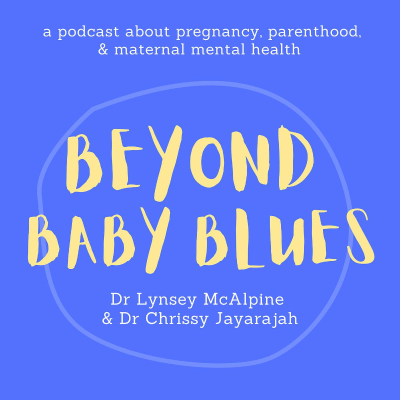
Beyond Baby Blues
Engels
Familie
Tijdelijke aanbieding
2 maanden voor € 1
Daarna € 9,99 / maandElk moment opzegbaar.
- 20 uur luisterboeken / maand
- Podcasts die je alleen op Podimo hoort
- Gratis podcasts
Over Beyond Baby Blues
Around 1 in 5 women will experience a mental health problem during pregnancy or in the early years after having a baby. In Beyond Baby Blues, perinatal psychiatrists Lynsey and Chrissy discuss topical issues in maternal mental health.This podcast is for anyone with an interest in pregnancy, parenting, and mental health: if you are a parent or expectant parent, a healthcare professional working with women and birthing people, or just want to know more about this emerging field, then there is something in the podcast for you! With thanks to the Royal College of Psychiatrists Faculty of Perinatal Psychiatry.
Alle afleveringen
11 afleveringenHyperemesis gravidarum
Pregnancy sickness is a spectrum: while most women experience some degree of pregnancy sickness, hyperemesis gravidarum (HG) is a severe form at the extreme end of the spectrum. It affects about 3% of pregnancies and it can involve serious physical and psychological complications. In this episode we think about HG from our perspective as perinatal psychiatrists: what do mental health professionals need to know about HG? how does it affect mental health? and what can we do to support women with this condition? Useful links: * Pregnancy Sickness Support [https://pregnancysicknesssupport.org.uk/] * The ObsPod episode on HG [https://www.buzzsprout.com/961453/episodes/14953546-episode-169-hyperemesis] * Pregnancy Unique Quantification of Emesis (PUQE) score [https://www.pathway.md/calculators/puqe-score-pregnancy-unique-quantification-of-emesis-and-nausea-recqocljHODBYjktF] * RCOG Green Top Guideline [https://www.rcog.org.uk/news/updated-rcog-green-top-guideline-on-the-management-of-nausea-and-vomiting-in-pregnancy-and-hyperemesis-gravidarum-published/] * Psychological morbidity associated with HG: a systematic review and meta-analysis [https://doi.org/10.1111/1471-0528.14180] (Mitchell-Jones et al, 2017) * Understanding the support needs of women with HG [https://www.sciencedirect.com/science/article/pii/S0266613825001561#bib0019] (Challacombe et al, 2025) If you or someone you know is struggling with mental health difficulties, there is lots of help available. You can contact your primary care provider in the first instance, or if you are based in the UK the NHS perinatal mental health website [https://www.nhs.uk/nhs-services/mental-health-services/find-care-for-your-mental-health-before-during-and-after-pregnancy/] will help you to find support in your local area.
Lived experience
Whether we are delivering clinical care or designing and improving healthcare services, the voice of lived experience should be at the heart of everything that we do. In this episode we speak to Sakina Ballard (trustee for Make Birth Better and Maternal Mental Health Alliance) about peer support and experts by experience in perinatal mental health. If you or someone you know is struggling with mental health difficulties, there is lots of help available. You can contact your primary care provider in the first instance, or if you are based in the UK the NHS perinatal mental health website [https://www.nhs.uk/nhs-services/mental-health-services/find-care-for-your-mental-health-before-during-and-after-pregnancy/] will help you to find support in your local area.
Infant feeding
Infant feeding is an intrinsic part of parenthood. When it goes well it can be incredibly rewarding, but it's not always straightforward and many parents experience difficulties. In this episode, Lynsey and Chrissy discuss the different factors that influence feeding decisions, the intricate relationship between infant feeding and mental health, and the challenges around medication and breastfeeding. References and resources: * Supporting positive conversations about feeding choice and mental health [https://maternalmentalhealthalliance.org/media/filer_public/cf/9c/cf9c67e0-0ce2-4ff4-9fcb-64dc71f528eb/supporting_positive_conversations_about_feeding_choice_and_mental_health_in_the_perinatal_period_resaved.pdf] (The Breastfeeding Network, 2017) * Guilt, shame, and postpartum feeding outcomes: [https://onlinelibrary.wiley.com/doi/full/10.1111/mcn.13141] a systematic review (Jackson et al., 2021) * The Breastfeeding Network [https://www.breastfeedingnetwork.org.uk/] * First Steps Nutrition Trust [https://www.firststepsnutrition.org/] * GP Infant Feeding Network [https://gpifn.org.uk/infant-feeding/] * World Health Organisation factsheets [https://www.who.int/news-room/fact-sheets/detail/infant-and-young-child-feeding] * The politics of breastfeeding - Gabriel Palmer * Why formula feeding matters - Shel Banks * Why breastfeeding matters - Charlotte Young If you or someone you know is struggling with mental health difficulties, there is lots of help available. You can contact your primary care provider in the first instance, or if you are based in the UK the NHS perinatal mental health website [https://www.nhs.uk/nhs-services/mental-health-services/find-care-for-your-mental-health-before-during-and-after-pregnancy/] will help you to find support in your local area.
Loneliness
There is a strong social narrative that pregnancy and parenthood should be a time filled with new connection, a strong sense of community, and abundant social support. In reality many parents can feel incredibly lonely and disconnected. In this episode, Lynsey and Chrissy are joined by Dr Kate Adlington to discuss the emotional, social, and existential facets of loneliness and the specific issue of loneliness in the perinatal period. What drives it? What is the relationship between loneliness and mental illness? And what can be done about it? Key references and resources: * Loneliness Conceptual Review [https://whatworkswellbeing.org/wp-content/uploads/2020/02/V3-FINAL-Loneliness-conceptual-review.pdf] (What Works Centre for Wellbeing, 2019) * “Juts snap out of it” - the experience of loneliness in women with perinatal depression: a meta synthesis of qualitative studies [https://www.ncbi.nlm.nih.gov/pmc/articles/PMC9970854/](Adlington et al, 2023) * Solutions to perinatal loneliness [https://figshare.com/articles/online_resource/_b_Solutions_to_Perinatal_Loneliness_b_/26219660] (Naughton-Doe, 2024) * Video - Where is the village that was promised? [https://www.youtube.com/watch?v=dkNsIXH-Aec] (Naughton-Doe, 2024) *content warning - reference to perinatal loss* * Guardian article - It felt shameful: the profound loneliness of modern motherhood [https://www.theguardian.com/lifeandstyle/article/2024/aug/21/it-felt-shameful-the-profound-loneliness-of-modern-motherhood] (Jones, 2024) If you or someone you know is struggling with mental health difficulties, there is lots of help available. You can contact your primary care provider in the first instance, or if you are based in the UK the NHS perinatal mental health website [https://www.nhs.uk/nhs-services/mental-health-services/find-care-for-your-mental-health-before-during-and-after-pregnancy/] will help you to find support in your local area.
ADHD
Attention deficit hyperactivity disorder (ADHD) affects up to 4% of the adult population although it is under-recognised and under-diagnosed in women and girls. In this episode we are joined by Dr Shevonne Matheiken, who shares her own lived and learned experience of ADHD and parenthood. We discuss the medical and social models of ADHD, the different ways that it can manifest, the challenges that can arise during major life transitions such as pregnancy and parenthood, and the implications for perinatal mental health. Resources and references for this episode: * Adult ADHD: time for a rethink? [https://www.cambridge.org/core/journals/bjpsych-advances/article/adult-attentiondeficit-hyperactivity-disorder-time-for-a-rethink/AAE76917D190C13B237326AAAB00414B] - Matheiken et al 2024 * ADHD & autism: before, during, and after pregnancy [https://www.tommys.org/pregnancy-information/planning-a-pregnancy/planning-a-pregnancy-and-mental-illness/other-disorders-and-pregnancy] - Tommy’s Pregnancy Hub * Females with ADHD: an expert consensus statement [https://bmcpsychiatry.biomedcentral.com/articles/10.1186/s12888-020-02707-9] - Young et al 2020 * Obstetric complications in mothers with ADHD [https://link.springer.com/article/10.1007/s40263-024-01076-1] - Walsh et al 2022 * ADHD medication use trajectories among women in the perinatal period [https://link.springer.com/article/10.1007/s40263-024-01076-1] - Bang Madsen et al 2024 * In utero exposure to ADHD medication and long-term offspring outcomes [https://pubmed.ncbi.nlm.nih.gov/36759544/]- Bang Madsen et al 2023 If you or someone you know is struggling with mental health difficulties, there is lots of help available. You can contact your primary care provider in the first instance, or if you are based in the UK the NHS perinatal mental health website [https://www.nhs.uk/nhs-services/mental-health-services/find-care-for-your-mental-health-before-during-and-after-pregnancy/] will help you to find support in your local area.
Kies je abonnement
Tijdelijke aanbieding
Premium
20 uur aan luisterboeken
Podcasts die je alleen op Podimo hoort
Gratis podcasts
Elk moment opzegbaar
2 maanden voor € 1
Daarna € 9,99 / maand
Premium Plus
Onbeperkt luisterboeken
Podcasts die je alleen op Podimo hoort
Gratis podcasts
Elk moment opzegbaar
Probeer 30 dagen gratis
Daarna € 11,99 / maand
2 maanden voor € 1. Daarna € 9,99 / maand. Elk moment opzegbaar.































